
|

|
Forum Index : Windmills : Servo motor for wind turbine
| Author | Message | ||||
| 97fishmt Regular Member Joined: 19/04/2010 Location: United StatesPosts: 77 |
This one starts to charge a 12 volt battery at 150 rpm and I see usually around 5-10 amps when the wind is blowing with a 6' hand carved prop on it. 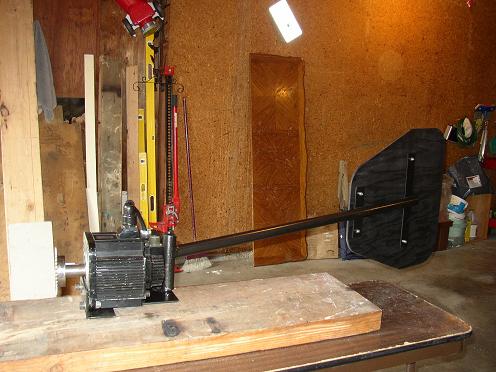
I do see more than 30 amps on occasion, I have the furling set up at 30 amps and 25mph winds to be safe for now. I feel I could push it more. I looked up this motors specs and it's max amps for the winding is 80 amps. I just need a better tower for it and a larger prop. This is my big unit I have on my main tower now. 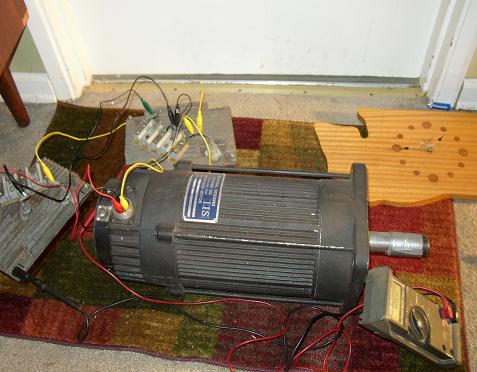
It charges a 12 volt battery at 60 rpm, too slow for a 12'prop. So I rewired my battery bank and bought a 24 volt inverter and set up a 1500 watt dump load. Now it charges the 24 volt bank at 120 rpm. I'm putting a larger prop on it as soon as I can get around to it. I expect to get 3000 watts out of it. 100 amps @30 volts. Its name plate says 300 volt 80 amps and 1500 rpm. I found the data sheet and its max amps is 320 amps. I just don't need all that power! This is a 20kw motor I got off ebay brand new for $50 and $50 for shipping. I just know what to look for. 
|
||||
| 97fishmt Regular Member Joined: 19/04/2010 Location: United StatesPosts: 77 |
Here is a 400 volt 4.5kw motor @1500 rpm It starts to charge my 24 volt bank @ 97 rpm. I'm getting 38 amps @ around 25 mph @30 volts a little over 1000 watts. I have about a dozen servo motors and they are all different. The trick is to match the blades to the motor. I can't even count all the props I have carved. So far 12' has been my biggest. I'm working on a larger one for the 20kw motor. I just need to get another tower up. That's where the real work is. 
Take care Mike |
||||
| Warpspeed Guru Joined: 09/08/2007 Location: AustraliaPosts: 4406 |
Me either Don, and the stepper/servo relationship was my first thought as well. But steppers are usually two phase, and the permanent magnets cause them to cog significantly. These appear to be three phase floating wye connected, and real monster motors. To have the low winding resistance, and the high volts per revolution that they have, the internal air gaps must be very small. Fitted with very powerful permanent magnets that they appear to have, I would have expected them to cog hugely. But nobody has mentioned this as being a problem. Very interesting stuff. Cheers, Tony. |
||||
| 97fishmt Regular Member Joined: 19/04/2010 Location: United StatesPosts: 77 |
Here is the big one after I got the 70' tower done. And the 8' & 10' props on these two machines. 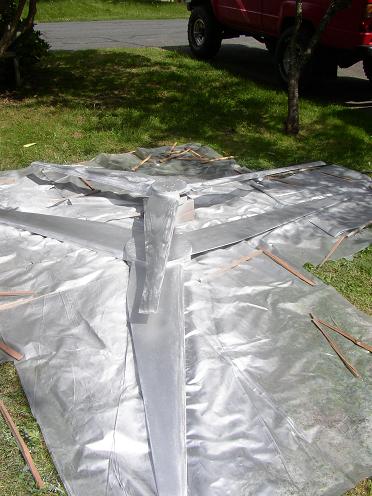
I've seen 80 amps @30 volts so far out of the big one with the 10' prop on it. It's a very well behaved machine. The picture above is when it is furling and still putting out massive power. (around 2000 watts) My tower is a Rohn 45G. It will handle a Bergy excel 26' prop. I'm not going to go that big but ya never know?  |
||||
| Warpspeed Guru Joined: 09/08/2007 Location: AustraliaPosts: 4406 |
O/k just went out to the shed and dug up a 15Hp three phase induction motor frame. The rating plate says 11Kw 2,930 rpm 415 volts 50 Hz 21 amps/phase. This sucker is just under about a one foot cube without the end plates. And it is HEAVY ! 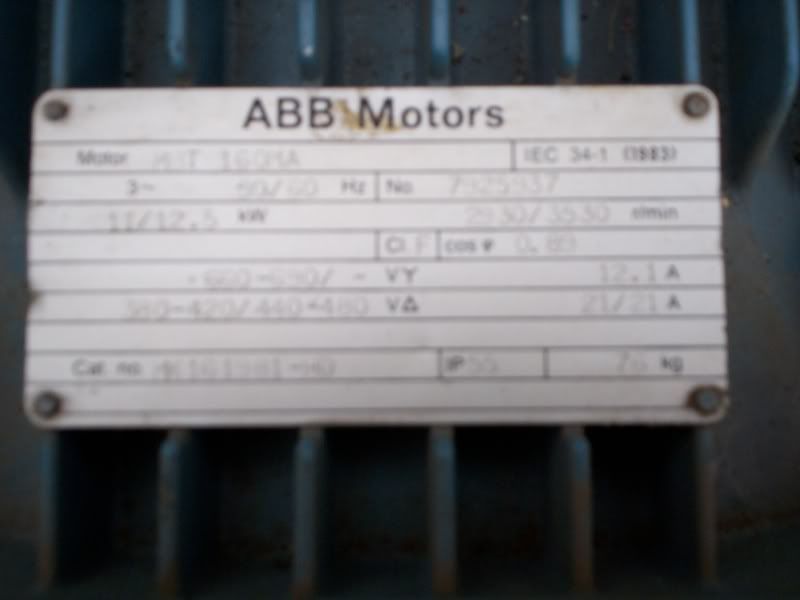
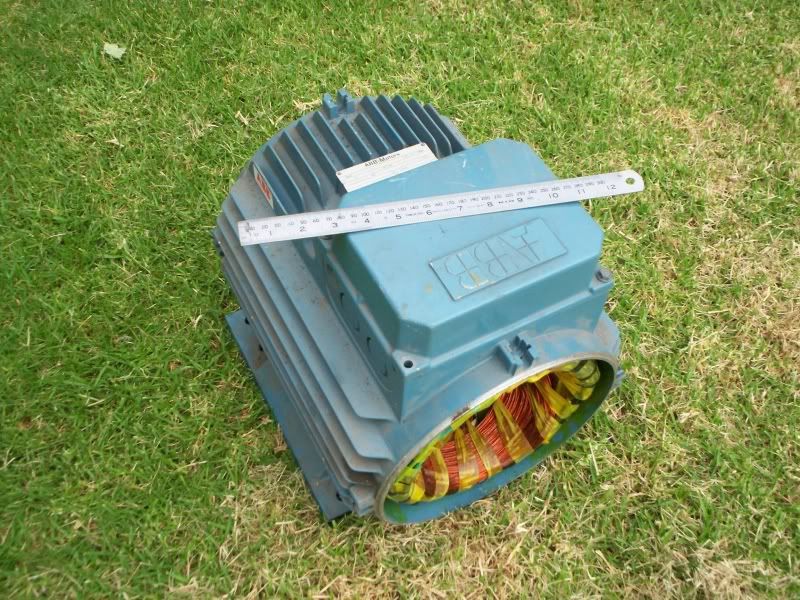
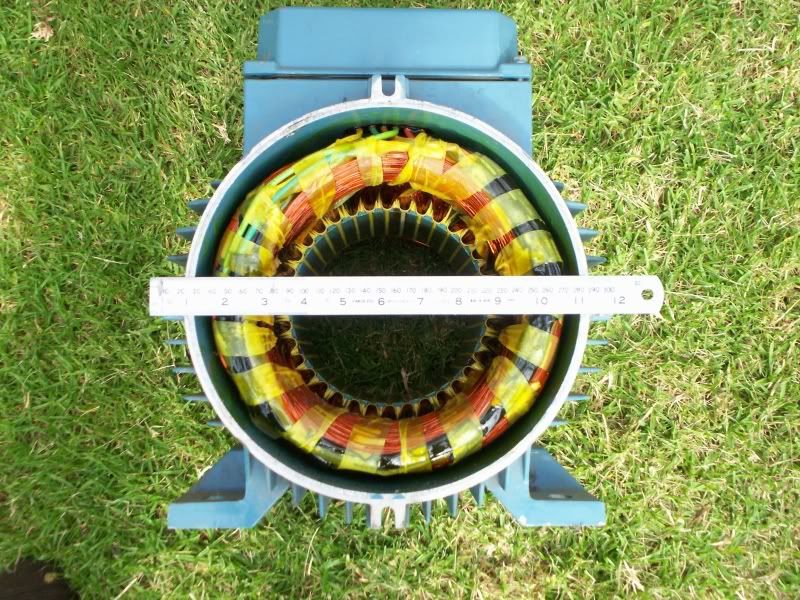
Now compare it to this 20Kw servo motor......... I just cannot get my head around how something that small can be rated almost TWICE as powerful. We are talking about maybe roughly double the torque at perhaps similar rpm. 
Cheers, Tony. |
||||
| 97fishmt Regular Member Joined: 19/04/2010 Location: United StatesPosts: 77 |
The older AC servo motors with the cobalt magnets in this size are very big and heavy 300+ pounds. This one has the neo magnets in it with 1/3 of the size and weight. 130 pounds. The magnets are skewed on the armature so there is no cogging. 1 3/8" shaft and bigger bearings than on my truck. No brushes to wear out. I know you have motors like this down under, they are in every corner of the world. You just have to look. 
|
||||
| 97fishmt Regular Member Joined: 19/04/2010 Location: United StatesPosts: 77 |
Here is the tag on the 400 volt motor. 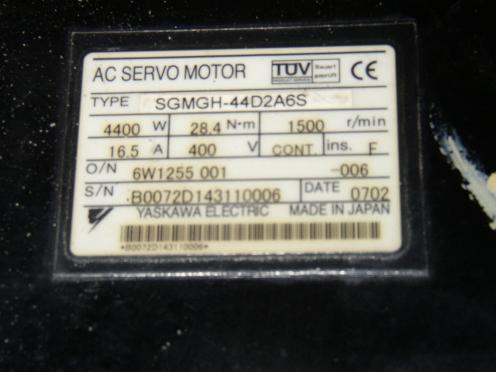
It measures 8" x 8"x 10" This is why I look for the newer ones. They are only about 30 pounds for a 1000 watt wind turbine. Good hunting.  |
||||
| Don B Senior Member Joined: 27/09/2008 Location: AustraliaPosts: 190 |
Hi all, Having had a further scan of the internet on stepper motors, and especially Wikipedia’s ever valuable listing, I believe that I have a little better understanding of the beast. First to the matter of definition. Strictly speaking, a servo is a combination of motor and some sort of encoder so that the position of the output shaft is known. A complete servo unit would include the controller that turns it to the extent that is needed in response to a control input. Radio controlled aircraft use servos. The motor in the type of servos that are under discussion in this thread are stepper motors. No matter, a rose by any other name ……. Basically, the stepper motors that we are looking at are fairly much similar in construction to a permanent magnet alternator. The Fanuc nameplate photo in a previous post shows an 8 pole, three phase, 2,000 rpm, 165V, 9A stepper motor. My reading of stepper motor data though is that it requires some interpretation when looking to use one as an alternator. The windings of a stepper motor are intended to be supplied with DC. To rotate the motor, the several windings are fed with sequential pulses of DC. One winding can also be supplied with continuous DC to hold the shaft position, though at substantially less than its rated voltage. In order to permit the current to build quickly in a winding when voltage is applied, the winding resistance and inductance are deliberately kept to very low values. This makes stepper motors potentially very suitable as wind generator alternators. When used as a motor, it is important to understand that you can not apply the rated voltage (165V for the Fanuk) for more than a very brief period before the current will increase to a value way above its rated current (9A for the Fanuk). This is due to the low winding resistance (not given on the Fanuk nameplate, but no doubt well below 1 Ohm). A stepper motor controller would undoubtedly have some sort of current chopping system that would limit the current to its rated value or less - even with 165V applied to the winding. The rated voltage as a motor is in effect the forcing voltage that can be withstood in order to quickly build the winding current to its rated value. If the rated voltage was continuously applied to a winding, the current would quickly rise to a value limited only by the winding resistance – probably somewhere around 200A. It should also be noted that the rated voltage will not give an indication of the voltage output of the stepper motor when spun at its rated speed. It will almost certainly be significantly less. This puzzled me in an earlier post, where I calculated that, from the data, Piggweed’s stepper motor would only generate around 25V when spun at 1,000 rpm, yet it was rated at 200V at 2,000 rpm. The reason for this discrepancy is now clear. The current rating is probably closer, however, as pointed out by someone in an earlier post, the current rating as a motor will be conservative when used as an alternator because, for one thing, the losses are being supplied by the turbine, not the incoming electrical power. For another, the cooling will be superior, and the ultimate winding current limit is determined by its temperature. Stepper motor voltage, current, and rpm ratings are therefore misleading when it comes to how a stepper motor would work as a wind generator alternator. The typically low winding resistance and inductance is very helpful indeed, and the critical issue is the volts per rpm. The most reliable way of determining suitability is to connect up the servo, rectifier, and battery in a lathe or similar, and see what shaft speed is needed to achieve the desired charge rate. A suitable turbine, and maybe the step up drive ratio, if needed, can then be determined. Regards Don B |
||||
| piggweed Newbie Joined: 09/01/2012 Location: United StatesPosts: 29 |
Don B, I beleave you are right. I had some old toaster ovens I stipped the heater eliments (radiator bars) out of and at 1100 rpm my ac current was 12.2 amps per leg and the voltage is 26vac. It takes 550 rpms to get 13.5 vac under load. I am wondering if I should use a 1 to 2 gear reduction or belt and pulleys to speed the servo's rpm up. Under load it took 55 rpm's to get 1 volt. I wish my rectifier would get here. I buy and sell lathes and have all kinds of gears on hand along with my own small machine shop, that makes it nice. Is it vary common to gear up on small wind turbines? Once I overcome this, then I will start looking at what type of tail to use. 97fishmt, nice looking turbine and blades. By the picture you can tell that's not TX. I drove to Eugene OR last summer and it looked a lot like that. |
||||
| Warpspeed Guru Joined: 09/08/2007 Location: AustraliaPosts: 4406 |
Yup, that pretty well nails it Don. I might suggest that a stepper motor is designed to position "something" accurately in small fractions of angular rotation, without any positional feedback. These are essentially an open loop direct positioning system. Servos are usually associated with reduction gearboxes and always have positional feedback, usually from a potentiometer, optical shaft encoder, or a resolver system. These are all closed loop systems by definition. Steppers are not always driven just by high current square waves with lumpy discrete steps. That can cause severe juddering of the shaft when driven between two positions. They are sometimes driven by two sine waves, with a sign and cosine relationship, coming out of a pair of d/a converters. This allows much finer resolution BETWEEN the discrete steps of a stepper motor. This technique is called "micro stepping". The whole topic is vast, and pretty interesting. Cheers, Tony. |
||||
| wilfor03 Newbie Joined: 22/03/2009 Location: United StatesPosts: 5 |
Yea, what Warpspeed said! All I know is, these things work, they're weatherproof, don't have brushes to replace, have heavy duty bearings, and they don't overheat when running hard. I put together a little 2.2a, 3000rpm Sanyo Denki servo motor, with a 4'6"(dia) PVC prop. I have this in series with a 1/4hp ECM motor (ghurd modified, of course) to produce low wind speed voltages (12vdc charging). We don't get any decent wind except in the winter months here in Alabama. But both of these in series, does the trick. I also have 360w of solar on a tracker panel for back up. That does really good, with the gennies for cloudy days. It's all 97fishmt's fault!!! He made me do it....  I also borrowed his idea I also borrowed his idea
for the universal mount and its worked super great. Thank you 97fishmt, "You da Man!!" I'm starting to put together an OMRON servo motor, 600w, 3000rpm, 240vac, with some 5' PVC blades. Really anxious to see what it will put out when it hits a decent wind. I hate these addictions we have!!! Again, thanks "97fishmt"..... 
Bill 
|
||||
| isaiah Guru Joined: 25/12/2009 Location: United StatesPosts: 303 |
In their intended service the servo will go either direction at an speed ( variable ) and also held in one position as a break. All that encoder and break stuff on the end of the servo is sold for scrap we locate the main 3 phase wires and do away with the rest. We are only using the magnets and the three phase wires. I suppose that some one in a very hi wind area might think about using the break although it would require a power source and the controller. Here we use a three phase switch to short the phases together manually applied. Also if you can get to the phase wiring inside they can be wired in different configuration. such as Delta Star,or Jerry. Yes Piggweed wait til you get the rectifier. we usually try to find 60 amp or more at @ 1000 volts and depending what you got it may need a heat sink. Be patience if you run into a problem some one here will gladly help you solve it. Piggweed sounds like you got a nice shop, I also am 44 yrs a retired machinist and have a small lathe and mill at home plus torch and welder also Bub73 is my brother and he dose the electronics been known to blow a battery or two now and then. Isaiah URL=http://www.motherearthnews.com/Renewable-Energy/1973-11- 01/The-Plowboy-Interview.aspx>The Plowboy Interview[/URL> |
||||
| piggweed Newbie Joined: 09/01/2012 Location: United StatesPosts: 29 |
When you get in a rush you make errors. I didn't notice I had two pcs of refective tape on my lathe chuck, 180 deg apart, I'm using a digital tach. Sorry to all for the bad numbers. New readings are under load, 30 rpms = 1vac, 350 rpms = 13.5vac @ 5 amps, 1400 rpms = 42vac @ 15.5 amps. these readings are 1 leg. So at 1400 rpms, 15.5 * 3 = 46.5 amps * 42vac = 1953 watts. Thats not to bad, now I will wait for the rectifier, I have two 100 ah deep cell batteries ready. Also, I don't know if the bearings are shielded or seal, but it has a national oil seal on the shaft, cup and spring facing the blades. |
||||
| isaiah Guru Joined: 25/12/2009 Location: United StatesPosts: 303 |
Well it sounds like you are all set for the smoke test when you get the rectifier. You'll be more pleased when you get it hooked up with the rectifier. Be sure to keep all the smoke in the wires! URL=http://www.motherearthnews.com/Renewable-Energy/1973-11- 01/The-Plowboy-Interview.aspx>The Plowboy Interview[/URL> |
||||
| piggweed Newbie Joined: 09/01/2012 Location: United StatesPosts: 29 |
10-4 goodbody, I was looking at the members profiles and noticed you live in Jones, MI. I spent 11 years traveling back and forth to Elkhart IN (10 to 12 times a yr for 11 yrs). While there I drove through Jones. Nice country of there, good fishing and hunting. I know a lot of good people up there. |
||||
| 97fishmt Regular Member Joined: 19/04/2010 Location: United StatesPosts: 77 |
Well here it is old stuff if you want to read it again. Maybe just for the new crowd. We hashed it out then too. http://www.thebackshed.com/forum/forum_posts.asp?TID=2589&PN =22 I didn't read it again but same old stuff if you missed it. Mike |
||||
| Warpspeed Guru Joined: 09/08/2007 Location: AustraliaPosts: 4406 |
Great info Mike, I missed that thread first time around. The problem over here, is that it may only cost $50.00 to buy in the US, but maybe another $150.00 to ship it half way around the World to Australia. Probably still a good deal, but not quite so good for us, as for you guys. These should work pretty well for a hydro project too. I am constantly amazed at how cheap everything is to buy in America compared to here. Just priced a particular auto darkening welding helmet recommended on the welding Forum. A Speedglas 100, US price $160.00 the exact same helmet on display at a BOC agency in Melbourne $385.00 By the time you add 10% GST tax, and convert to US dollars it is almost THREE times the price in US dollars for the absolute same identical welding helmet. Cheers, Tony. |
||||
| 97fishmt Regular Member Joined: 19/04/2010 Location: United StatesPosts: 77 |
You do have ebay in Australia I looked today, they are there just keep an eye out or like our host he found a robot and salvaged the motors. Even so some from china are free shipping. If you were going to build an axial flux machine the magnets would cost more than one of these motors if you do your homework, and you'll have a totally sealed machine that will last a long time with no service involved. This is how the big boys do it (store bought wind turbines) a 3 phase permanent magnet alternator. I just followed the scent and copping them. That's how I got into the servo's, that's what they are. See if you can find one and tell us how you put it together. Mike |
||||
| isaiah Guru Joined: 25/12/2009 Location: United StatesPosts: 303 |
Piggweed I sent you a private message. Mike thank you for putting up all the information you have good job. I have to build several motor mounts here shortly for some servo's we will be putting up. One of the servo's will be replacing the 1hp ECM that is up now.ITs been up over a year but it dont put out the amps that the servo's do. I got that servo real cheap as the break froze up and the motor wouldnt turn with a big hammer we smashed the break off and the motor turns good now. Isaiah URL=http://www.motherearthnews.com/Renewable-Energy/1973-11- 01/The-Plowboy-Interview.aspx>The Plowboy Interview[/URL> |
||||
| 97fishmt Regular Member Joined: 19/04/2010 Location: United StatesPosts: 77 |
wilfor03, glad it's working out! I just can't help it, I love this addiction. I knew there would be a few people that would take a chance like I did and try something new. Like a leap of faith and the rewards are huge when you discover that it works! Enjoy your new hobby, I really do it for the power to keep the lights on and power tools. I welded the tower parts up with solar and wind power. It works for me! Thanks for posting and your welcome! 
Mike |
||||